八年级英语上册Unit7WillpeoplehaverobotsPeriod6教案新版人教新目标版
- 格式:doc
- 大小:39.00 KB
- 文档页数:3
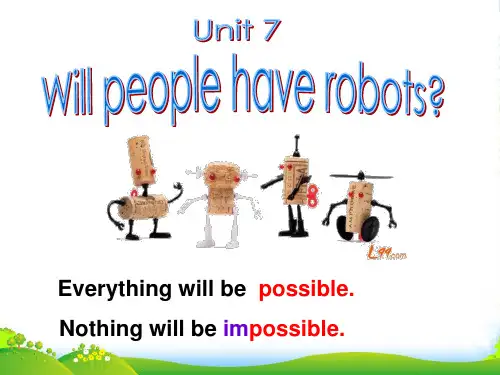
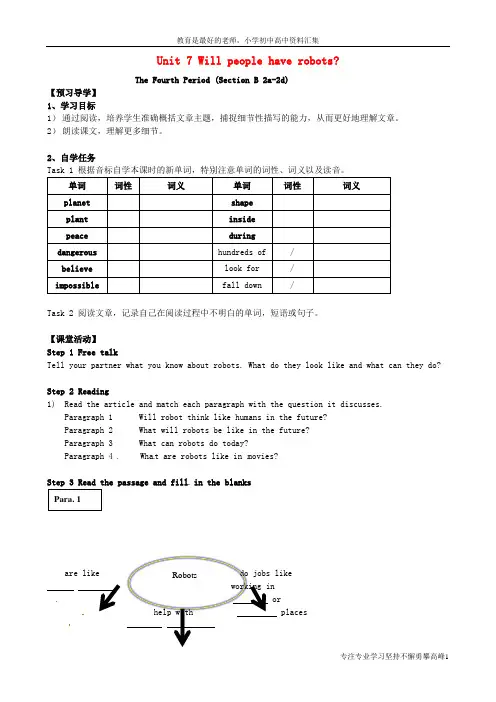
Unit 7 Will people have robots?The Fourth Period (Section B 2a-2d) 【预习导学】 1、学习目标1) 通过阅读,培养学生准确概括文章主题,捕捉细节性描写的能力,从而更好地理解文章。
2) 朗读课文,理解更多细节。
2、自学任务Task 2 阅读文章,记录自己在阅读过程中不明白的单词,短语或句子。
【课堂活动】Step 1 Free talkTell your partner what you know about robots. What do they look like and what can they do?Step 2 Reading1) Read the article and match each paragraph with the question it discusses.Paragraph 1 Will robot think like humans in the future? Paragraph 2 What will robots be like in the future? Paragraph 3 What can robots do today?Paragraph 4 What are robots like in movies?Step 3 Read the passage and fill in the blanksare like do jobs like working in orplacesRobots_______ ________work in ________help to _______ ________ Robots ________do things ______ ______ ______ _______never _______ ________Step 4 Summary (2d )Fill in the blanks with the words from the article.Step 5 Writi ng ( 2e )Use your imagination (想象力) and write down your idea about the robots in the future. What will robots look like? What will robots be able to do?【训练反馈】 Ⅰ. 选择填空。
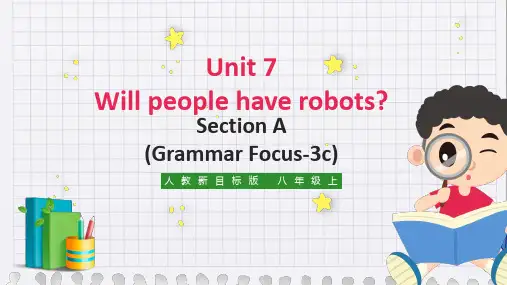
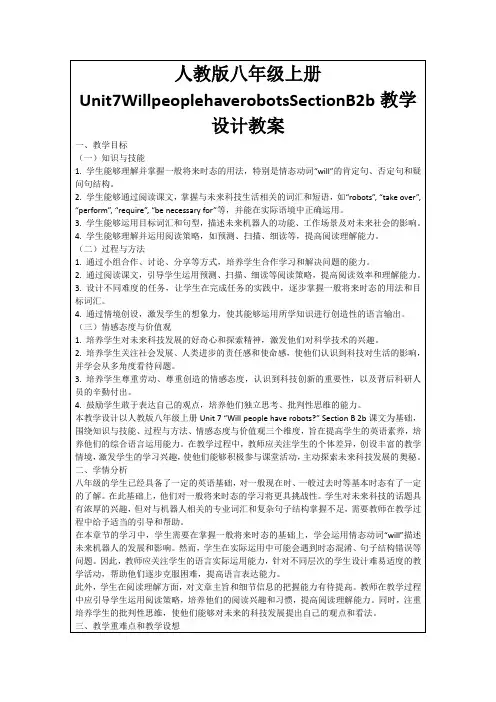
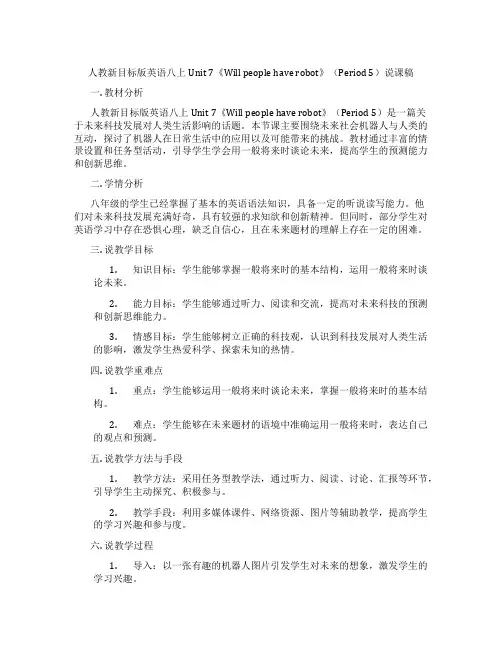
人教新目标版英语八上Unit 7《Will people have robot》(Period 5)说课稿一. 教材分析人教新目标版英语八上Unit 7《Will people have robot》(Period 5)是一篇关于未来科技发展对人类生活影响的话题。
本节课主要围绕未来社会机器人与人类的互动,探讨了机器人在日常生活中的应用以及可能带来的挑战。
教材通过丰富的情景设置和任务型活动,引导学生学会用一般将来时谈论未来,提高学生的预测能力和创新思维。
二. 学情分析八年级的学生已经掌握了基本的英语语法知识,具备一定的听说读写能力。
他们对未来科技发展充满好奇,具有较强的求知欲和创新精神。
但同时,部分学生对英语学习中存在恐惧心理,缺乏自信心,且在未来题材的理解上存在一定的困难。
三. 说教学目标1.知识目标:学生能够掌握一般将来时的基本结构,运用一般将来时谈论未来。
2.能力目标:学生能够通过听力、阅读和交流,提高对未来科技的预测和创新思维能力。
3.情感目标:学生能够树立正确的科技观,认识到科技发展对人类生活的影响,激发学生热爱科学、探索未知的热情。
四. 说教学重难点1.重点:学生能够运用一般将来时谈论未来,掌握一般将来时的基本结构。
2.难点:学生能够在未来题材的语境中准确运用一般将来时,表达自己的观点和预测。
五. 说教学方法与手段1.教学方法:采用任务型教学法,通过听力、阅读、讨论、汇报等环节,引导学生主动探究、积极参与。
2.教学手段:利用多媒体课件、网络资源、图片等辅助教学,提高学生的学习兴趣和参与度。
六. 说教学过程1.导入:以一张有趣的机器人图片引发学生对未来的想象,激发学生的学习兴趣。
2.听力活动:播放一段关于未来机器人的听力材料,学生听后回答相关问题,培养学生获取信息、处理信息的能力。
3.阅读理解:学生阅读一篇关于未来机器人的文章,通过回答问题、小组讨论等方式,提高学生的阅读理解和批判性思维能力。
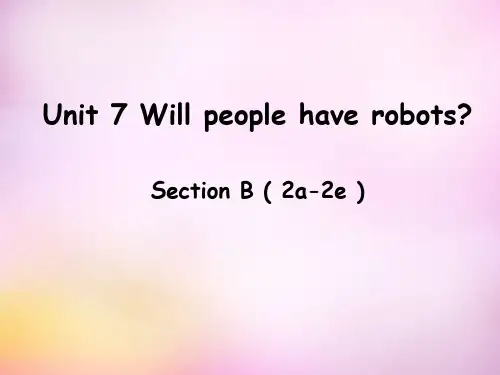
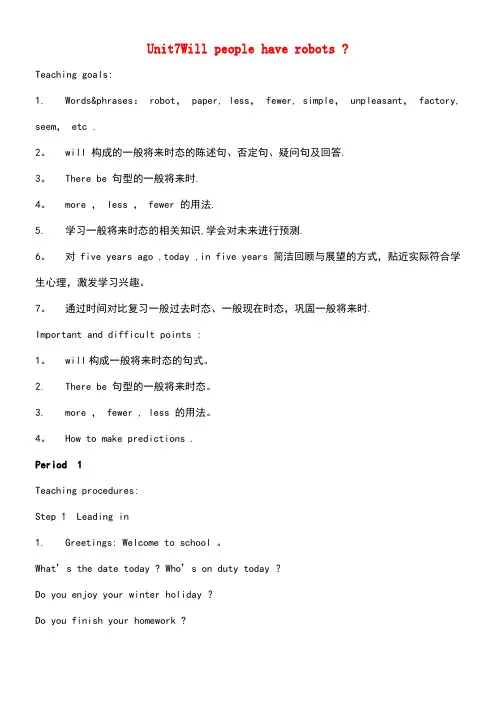
Unit7Will people have robots ?Teaching goals:1. Words&phrases: robot, paper, less, fewer, simple, unpleasant, factory, seem, etc .2。
will 构成的一般将来时态的陈述句、否定句、疑问句及回答.3。
There be 句型的一般将来时.4。
more , less , fewer 的用法.5. 学习一般将来时态的相关知识,学会对未来进行预测.6。
对five years ago ,today ,in five years 简洁回顾与展望的方式,贴近实际符合学生心理,激发学习兴趣。
7。
通过时间对比复习一般过去时态、一般现在时态,巩固一般将来时.Important and difficult points :1。
will构成一般将来时态的句式。
2. There be 句型的一般将来时态。
3. more , fewer , less 的用法。
4。
How to make predictions .Period 1Teaching procedures:Step 1 Leading in1. Greetings: Welcome to school 。
What’s the date today ? Who’s on duty today ?Do you enjoy your winter holiday ?Do you finish your homework ?Do you want to live on the moon ?Can you guess what will happen in ten years ?Collect t he Ss’ answers and say something about their predictions .Step 2 Pre-taskSB Page 2 ,1a .1。
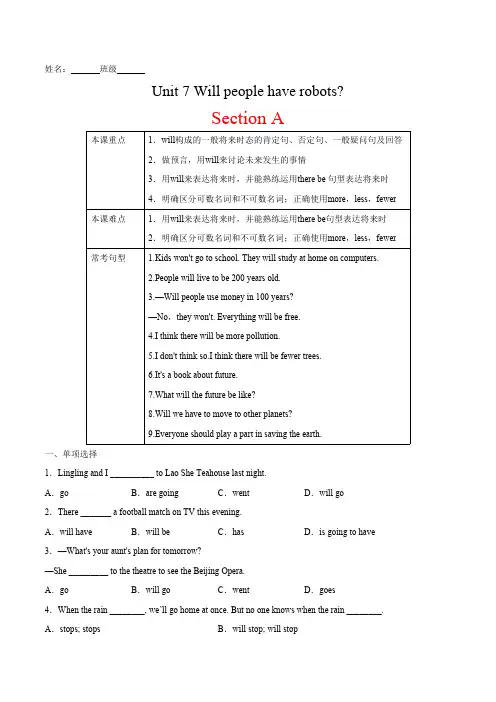
姓名:班级Unit 7 Will people have robots?Section A本课重点1.will构成的一般将来时态的肯定句、否定句、一般疑问句及回答2.做预言,用will来讨论未来发生的事情3.用will来表达将来时,并能熟练运用there be 句型表达将来时4.明确区分可数名词和不可数名词;正确使用more,less,fewer 本课难点1.用will来表达将来时,并能熟练运用there be句型表达将来时2.明确区分可数名词和不可数名词;正确使用more,less,fewer 常考句型 1.Kids won't go to school. They will study at home on computers.2.People will live to be 200 years old.3.—Will people use money in 100 years?—No,they won't. Everything will be free.4.I think there will be more pollution.5.I don't think so.I think there will be fewer trees.6.It's a book about future.7.What will the future be like?8.Will we have to move to other planets?9.Everyone should play a part in saving the earth.一、单项选择1.Lingling and I __________ to Lao She Teahouse last night.A.go B.are going C.went D.will go2.There _______ a football match on TV this evening.A.will have B.will be C.has D.is going to have 3.—What's your aunt's plan for tomorrow?—She _________ to the theatre to see the Beijing Opera.A.go B.will go C.went D.goes4.When the rain ________, we’ll go home at once. But no one knows when the rain ________. A.stops; stops B.will stop; will stopC.stops; will stop D.will stop; stops5.If we do nothing to protect giant pandas, there ________ no more giant pandas in the future. A.will have B.will has C.will be D.will be going to have 6.—Will you go to the cinema with me tomorrow?—Sorry, I _____ skating with Tom.A.go B.goes C.went D.will go7.What will the future ________ like?A.is B.are C.am D.be8.— Will there be more schools in 20 years’ time?—________. I think students will study by Internet at home.A.No, there aren’t B.Yes, there are C.No, there won’t D.Yes, there will 9.The air ________ here makes me uncomfortable.A.discussion B.relationship C.pollution D.information 10.——How soon will he come back? ——___________ two days.A.Before B.After C.In D.For二、用所给词的适当形式填空。
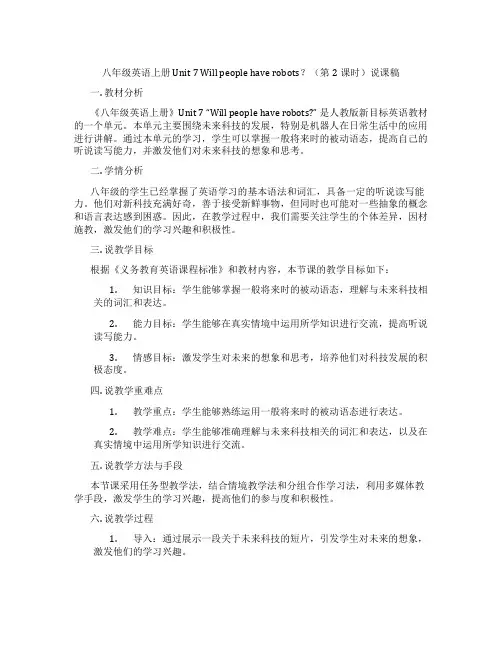
八年级英语上册 Unit 7 Will people have robots?(第2课时)说课稿一. 教材分析《八年级英语上册》Unit 7 “Will people have robots?” 是人教版新目标英语教材的一个单元。
本单元主要围绕未来科技的发展,特别是机器人在日常生活中的应用进行讲解。
通过本单元的学习,学生可以掌握一般将来时的被动语态,提高自己的听说读写能力,并激发他们对未来科技的想象和思考。
二. 学情分析八年级的学生已经掌握了英语学习的基本语法和词汇,具备一定的听说读写能力。
他们对新科技充满好奇,善于接受新鲜事物,但同时也可能对一些抽象的概念和语言表达感到困惑。
因此,在教学过程中,我们需要关注学生的个体差异,因材施教,激发他们的学习兴趣和积极性。
三. 说教学目标根据《义务教育英语课程标准》和教材内容,本节课的教学目标如下:1.知识目标:学生能够掌握一般将来时的被动语态,理解与未来科技相关的词汇和表达。
2.能力目标:学生能够在真实情境中运用所学知识进行交流,提高听说读写能力。
3.情感目标:激发学生对未来的想象和思考,培养他们对科技发展的积极态度。
四. 说教学重难点1.教学重点:学生能够熟练运用一般将来时的被动语态进行表达。
2.教学难点:学生能够准确理解与未来科技相关的词汇和表达,以及在真实情境中运用所学知识进行交流。
五. 说教学方法与手段本节课采用任务型教学法,结合情境教学法和分组合作学习法,利用多媒体教学手段,激发学生的学习兴趣,提高他们的参与度和积极性。
六. 说教学过程1.导入:通过展示一段关于未来科技的短片,引发学生对未来的想象,激发他们的学习兴趣。
2.呈现:教师通过PPT展示本节课的主要内容,引导学生关注一般将来时的被动语态和与未来科技相关的词汇。
3.操练:学生分组进行角色扮演,运用所学知识进行对话,教师给予指导和反馈。
4.巩固:学生完成一组有关未来科技的练习题,检测他们对知识的掌握程度。
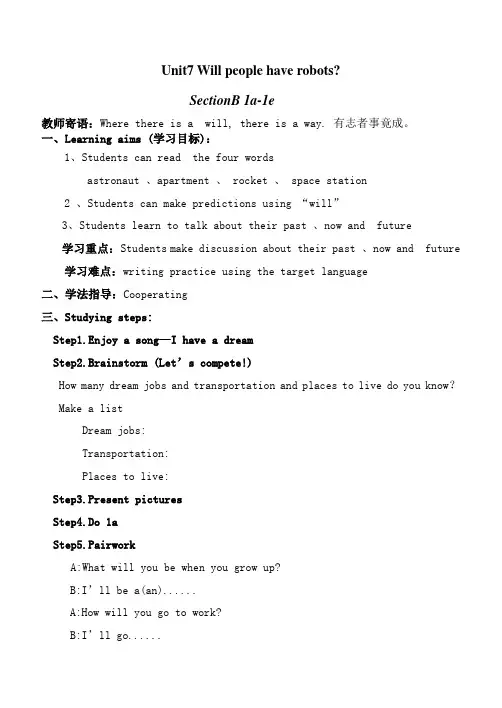
Unit7 Will people have robots?SectionB 1a-1e教师寄语:Where there is a will, there is a way. 有志者事竟成。
一、Learning aims (学习目标):1、Students can read the four wordsastronaut 、apartment 、 rocket 、 space station2 、Students can make predictions using “will”3、Students learn to talk about their past 、now and future学习重点:Students make discussion about their past 、now and future 学习难点:writing practice using the target language二、学法指导:Cooperating三、Studying steps:Step1.Enjoy a song—I have a dreamStep2.Brainstorm (Let’s compete!)How many dream jobs and transportation and places to live do you know? Make a listDream jobs:Transportation:Places to live:Step3.Present picturesStep4.Do 1aStep5.PairworkA:What will you be when you grow up?B:I’ll be a(an)......A:How will you go to work?B:I’ll go......A:Where will you live?B:I’ll live......Step6.Listening practiceFirst,(1c) Listen to Alexis and Joe. Number the pictures [1-3].Next,(1d) Listen again. Fill in the blanks with the correct verbs in the box.Step7.Talk ShowNow interview(采访) everyone’s life now,five years ago and five years from now in your groups.Name Now five years ago In five yearsInterviewer(采访者):......A:......B: ......C: ......... ... ...Step8. WritingAccording to the above results. I think you can do some writing,then report like this:In my group, Zhang Wei was a...and he played soccer and he had ...five years ago.But now he is a...四、Self—check(自我检测)单项选择1.In ten years, John_______ an astronaut.A. isB. will beC. wasD. will2.Mary_______computer science last year.A. studiedB. studiesC. will study3. What_______the world be like in 50 years?A. isB. willC. wasD. are五、Blackboard Design1、key wordsAstronaut rocket apartment space station2、key pointsPlayed ---- play --- will play六、Homework想像一下20年之前的郑州、看看现在的郑州,再设想一下20年之后的郑州,然后小组讨论并写一篇80字左右的文章。
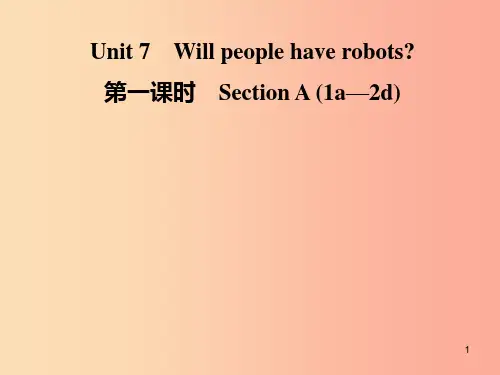
Will people have robots?Period 4 Section B( 1a-1e)一、学习目标:1、知识目标:(1).熟练掌握词汇:astronaut, rocket, space, space station, fly, took, moon,take the train(2).熟练掌握以下句型(a) A:What do you think your life will be like in ten years? B: I think I’ll be an astronaut.(b) A: Where will you live? B: I’ll live on a space station.(c) I’ll fly rockets on the moon.(d) Maybe there will be flights to other planets.2、技能目标:(1). 继续学习will表将来的用法并能熟练运用will句式对未来进行预测。
(2). 通过时间对比复习一般过去时态、一般现在时态,巩固一般将来时。
3、情感态度:能根据自己过去和现在的实际情况预测未来,拥有远大的理想并为之努力。
二、学习重难点:1.一般现在时和一般将来时的运用。
2. 1.more,less,fewer的用法课前探究收集有关职业和交通工具的名词。
Job:________________ ____________________Transportation:___________________ ________________预习交流通过复习和预习,1.我会:2.我不会:预习后还存在的困惑?___________________________________互助提升Before listening1.朗读la单词,理解其汉意,并按照职业、交通工具、居住地点进行分类,完成表格。
2.Groupwork:除了1a中列举的这些词汇,你还掌握哪些类似词汇?结合课前准备Ⅰ的内容,进行小组讨论。
Unit 7 Will people have robots?Period 1 Section A 1a-2cTeaching aims:1. Students learn to talk about future intentions.2. .The students will be able to learn the words and phrases:will , won’t , in the future, predict, prediction, paper, live to be , world peace, there will be , there won’t be …3. The students will be able to use the expressions:(1). What will the future be like ?(2). People will live to be 200 years ol d.(3). People won’t go to work in 100 years.(4). Will people use money in 100 years?--- Yes, they will. ---No, they won’t.(5). There will be more free time in the future.(6) There won’t be much pollution in the future.(7)There will be more/ less/ fewer …Ability aims:1.The students can use the questions to get information to improve their listening andspeaking abilities.2.To train the students’ cooperation with their partners.Key and important difficult points:A. VocabularyB. Target language(1). What will the future be like?(2). People will live to be 200 years ol d.(3). People won’t go to work in 100 years.(4). Will people use money in 100 years?--- Yes, they will. ---No, they won’t.(5). There will be more free time in the future.(6) There won’t be much pollution in the future.(7)There will be more/ much/less/ fewer …C.Grammar: The simpl e future tense.Emotional aims:To help the students to make their future plan and play a part in saving the earth!Teaching procedures:Before class: Students learn by themselves.Step 1 Warming up.1. Listen to a song.2. Show the title.Step 2 New language presentation.1. T: What will I be in 20 years ?I will be a grandmother. I won’t be a teacher in 20 years.won’t= will not (将不会)Write; I will be..I won’t be…. won’t= will not (将不会)2. Pair work.A: What will you be in 20 years ? B: I will be a/ an __________.A: How will you do that? B : I will ____________.Write : I will practice playing basketball.3. T; What will our life be like in 100 years?(1). Demonstrate; Learn and read.(2). Students learn in their group.(3). Read.Step 3 Work on 1a.1. Read the sentences.2. How will the world be different 100 years from now? Read thepredictions in 1a. Check A for agree or D for disagree.3. Show their answers: I agree /disagree that ____________________. Step 4 Work on 1b.1. T: Now listen to the recording and circle the predictions you hear in 1a.2. Play the recording for the Ss to listen and circle the predictions.3. Play the recording again.4. Check the answers with the Ss.5. Read .Step 5.Pair work.1. Let Ss read the first conversation in 1c after the teacher.2. Then let Ss ask and answer questions about the predictions in 1a.Then make their own conversation.3. Let some pairs ask and answer about their conversations.Step 6Step 2 New language presentation.T: Make more predictions.Structures :Will there be more schools? Yes, there will. / Yes, there won’t.There will be more people.Step 7 Work on 2a:1. Read the sentences in 2a. Tell Ss they will listen to somesentences. They should listen and circle the words in the bracket.2. Play the recording for the Ss to listen and circle the words.3. Play the recording again to check the answers.Work on 2b:1. Let Ss read the sentences below. Explain some main sentencesfor the Ss. Make sure they know what to do.2. Play the recording for the Ss to check the predictions they hear.3. Play the recording again to check the answers.Step 8 Game.Predict the world in the future. You can make predictions about 2 or 3 things such as the robots, the schools and so on.We will…We won’t…There will be more/ less/ fewer …Step 9 Summarize and do some exercises.板书:Unit 7 Will people have robots?Period 1 Section A 1a-2cI will be..I won’t be…. won’t= will not (将不会)A: Will people use money in 100 years?B: No, they won’t. Everything will be free.Will people live to be 200 years old?A: Yes, they will. People will live to be 200 years ol d.Will there be more schools? Yes, there will. / Yes, there won’t.There will be more peopl e.Period 2 Section A 2d-3cTeaching aims:1.The students will be able to learn the words and phrases:future,pollute, environment,planet,earth,play a part,worldpeace, sea, sky2. The students will be able to use the expressions:(1) A: Will you live to be 200 years old? B: Yes, I will. / No, I won’t.(2) Kids will study at home on computers.(3) They won’t go to school.3. The students will be able to use “more, less, fewer”.(1) There will be more cars.(2) There will be more pollution.(3) There will be less free time.(4) There will be fewer trees.Ability aims:2.The students can use the questions to get information to improve their listening andspeaking abilities.2.To train the students’ cooperation with their partners.Key and important difficult points:A. VocabularyB. Target languageD.Grammar: The simpl e future tense.Emotional aims:To help the students to make their future plan and play a part in saving the earth!Teaching procedures:Before class: Stud ents learn by themselves.Step1: Warming up ----Listen to a song.Step2: Lead—in1. Show the pictures and talk about the earth.What will the earth be like in ten years?New words: pollute, environment, planet., earth, in great danger, play a part.2. What will you do for the earth?I will…Step 3: Work on Section A 2d.1. Read the conversation quickly and answer two Qs.2. Listen and repeat. Then read aloud for 5 minutes to recite.3. Rol e--- play the conversation.4. Make their own conversations.Step 4 Grammar focus.1. Show the sentences and think, What are the rules?仔细观察例句,体会并写出画线部分的时态结构,并翻译时间状语。